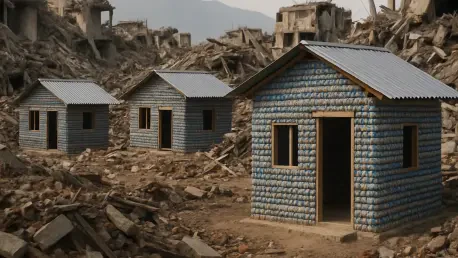In a world grappling with environmental crises and housing shortages, an extraordinary initiative in Nigeria is turning heads by transforming discarded plastic bottles into sturdy, earthquake-resistant homes. This innovative approach not only tackles the pressing issue of plastic waste pollution but also offers a lifeline to communities in need of affordable and safe shelter. By repurposing materials that would otherwise clog landfills, local residents are crafting structures capable of withstanding seismic shocks, a critical feature in regions vulnerable to natural disasters. Beyond the immediate benefits of housing, this movement represents a beacon of sustainability and resilience, showcasing how ingenuity can address multiple global challenges simultaneously. It’s a story of resourcefulness, where waste becomes a building block for a better future, inspiring hope that similar solutions could emerge elsewhere.
A Sustainable Solution to Plastic Waste
One of the most striking aspects of this Nigerian initiative is its contribution to environmental sustainability, as it repurposes non-biodegradable plastic bottles into a valuable construction resource. The process is remarkably straightforward yet effective: bottles are filled with sand or soil to add weight and stability, then stacked and bound with mortar to form durable walls. This method significantly reduces the volume of plastic waste that would otherwise pollute landscapes and waterways, aligning with global efforts to combat climate change. Moreover, it highlights a growing trend of recycling everyday refuse into functional materials, offering a model for other nations facing similar environmental challenges. The impact extends beyond mere waste reduction, fostering a mindset of circular economy where discarded items find new purpose. As communities embrace this practice, they contribute to a cleaner environment while addressing the urgent need for housing, proving that sustainable solutions can be both practical and transformative.
Resilience Against Natural Disasters
The earthquake-proof nature of these plastic bottle homes stands out as a game-changer, particularly in areas prone to seismic activity where traditional building materials often fail under stress. Unlike rigid structures made of brick or concrete, the flexible walls constructed from plastic bottles can absorb and dissipate energy during tremors, significantly lowering the risk of collapse. This resilience is vital for safeguarding lives in disaster-prone regions, offering a sense of security to families who might otherwise live in constant fear of structural failure. While the technique is still in its early stages and lacks widespread standardized testing, initial observations and community feedback suggest a promising future for this approach. Experts note that further research is essential to ensure long-term durability and safety, but the potential to revolutionize affordable housing in vulnerable areas is undeniable. This innovation not only addresses immediate safety concerns but also sets a precedent for adaptive architecture in the face of natural calamities.









